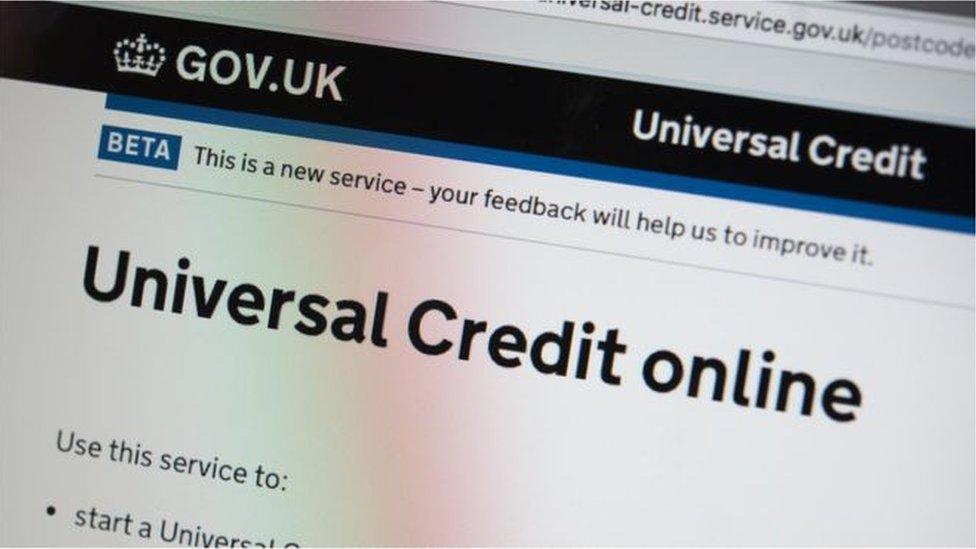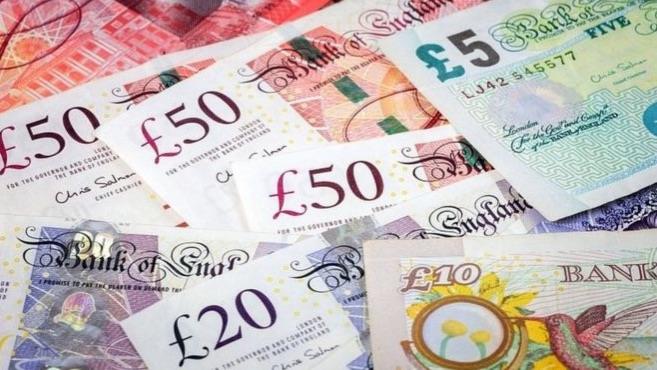Coronavirus: Cross-border workers 'left in limbo' over benefits
- Published

Ireland's coronavirus wage subsidy scheme is open to Northern Ireland residents who work in the Republic
Both the UK and Irish governments have introduced special measures to help the many thousands of people who cannot work because of the coronavirus pandemic.
But the financial support available to cross-border workers is dependent on which side of the border you live.
It also depends on whether you become "wholly unemployed" or whether your employer agrees to keep you on their payroll by claiming government support on your behalf.
Some people from Northern Ireland who are working in the Republic, for example, have found themselves unable to claim a special emergency unemployment payment introduced by the Irish government.
So what is the situation for those working in one jurisdiction but living in the other and who have found themselves laid off as a result of the crisis?
What happens if you lose your job in Northern Ireland due to the Covid-19 outbreak?
Laid-off workers who cannot find a new job can apply for Universal Credit in Northern Ireland, but this benefit is only available to those with UK addresses.
Republic of Ireland residents who lose their jobs in Northern Ireland cannot apply for unemployment benefits in the UK.
However, this group would qualify for the Irish government's €350 weekly unemployment pandemic payment, external due to their Republic of Ireland address.
What happens if you lose your job in the Republic of Ireland due to the Covid-19 outbreak, but you live in Northern Ireland?
Northern Ireland residents who lose their jobs across the border are not eligible for the €350 payment, even though they may have paid taxes to the Irish state for years.
A small number received the payment in error, but have now been asked to return the cash.
People in this position can apply for UK benefits if they cannot find another job, as they are not entitled to claim unemployment benefits from the Irish state.

A SIMPLE GUIDE: How do I protect myself?
AVOIDING CONTACT: The rules on self-isolation and exercise
LOOK-UP TOOL: Check cases in your area
MAPS AND CHARTS: Visual guide to the outbreak

Ireland has, however, established a wage subsidy scheme which is open to Northern Ireland residents.
The Irish government has agreed to pay 70% of employees' wages - up to a maximum of €410 (£362) a week - under its Temporary Covid-19 Wage Subsidy scheme.
Why can't cross-border workers from NI claim the Irish €350 unemployment pandemic payment?
Under long-standing EU regulations, when cross-border workers (or "frontier workers" as they are also known) lose jobs, they must claim unemployment benefits in the country in which they live, referred to as their "state of residence".
Can cross-border workers' jobs be protected through furlough-type schemes?
Yes, in a bid to prevent mass unemployment, both the British and Irish governments have introduced different schemes in which the state will cover a large percentage of employees' wages as long as their employer agrees to keep them on the payroll.
The UK furloughing scheme is open to cross-border workers with addresses in the Republic of Ireland.
All employees can receive 80% of their regular pay, up to a limit of £2,500 a month, if their employer applies to the UK's Coronavirus Job Retention Scheme for a grant to cover the bill.
Why are some cross-border workers from Northern Ireland complaining of discrimination?
Some of these employees have seen their Republic of Ireland colleagues already receive Irish unemployment payments of €350 a week, while they face a five-week wait for UK benefits.
Gerry McKeever from Londonderry has worked for the past 14 years in the hospitality industry in County Donegal.
But in mid-March, he got a letter from his employer to say he was being laid off until further notice due to the pandemic.
Mr McKeever said he was initially advised he could claim the Covid-19 unemployment payment in the Republic of Ireland, but later found out he was not eligible because of his Northern Ireland address.

He told BBC News NI that he has been "left in limbo" and has been without income or benefits for the past three weeks.
"It's hard to talk about money when people are sick and dying around you - it's embarrassing," he said, but added he has now "no income at all".
His last full pay cheque arrived three weeks ago, and as the sole earner in his family he is running out of money even to cover the basics such as food and rent.
In theory, Mr McKeever could apply for UK benefits, but feels as an Irish taxpayer there is a "point of principle at stake".
He said for the past 14 years he has paid hundreds of euros in taxes each month to the Republic of Ireland and feels that he and thousands of other cross-border taxpayers have been abandoned at a time of crisis.
"The Irish government is washing their hands of us," he said.
What has the Irish government said in response to complaints like this?
"Where individuals who are frontier workers have become fully unemployed, the Department of Employment Affairs and Social Protection reiterates that it is the state of residence who is the competent state for the provision of social welfare payments," a DEASP spokeswoman said.

It normally takes five weeks for a first Universal Credit payment to arrive in a claimant's bank account
She pointed out cross-border workers from Northern Ireland can receive an income from the Irish state via the Covid-19 wage subsidy scheme, with the "co-operation of their employers".
How long will laid off workers have to wait for a Universal Credit payment?
It normally takes five weeks for a first Universal Credit payment to arrive in a claimant's bank account, according to benefits expert Kevin Higgins from Advice NI.
However, he acknowledged benefits officials were currently facing an "unprecedented" rise in claims because of the Covid-19 outbreak.
In the last three weeks, 45,000 new Universal Credit claims have been submitted in Northern Ireland - a "tenfold increase" according to Stormont's Department for Communities (DfC).
Despite the upsurge, DfC said 98% of claims were being paid on time.
What help is available for laid-off workers from Northern Ireland who face weeks without benefits?
Claimants who do not have enough money to get through the five-week wait can apply for an advance on their first Universal Credit payment.
However, this loan must be paid back when you receive your first payment, Mr Higgins warned.
Instead, he advised those in hardship to seek support from the Universal Credit Contingency Fund, which is a non-repayable grant as opposed to a loan.
Stormont's Department for Communities said this fund and a further "Discretionary Support" scheme were "specifically developed" in Northern Ireland to help those who need financial support.
- Published10 April 2020

- Published2 April 2020

- Published11 April 2020
